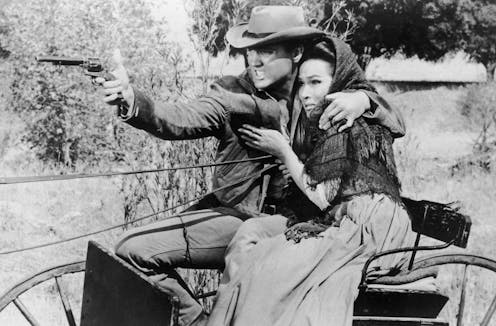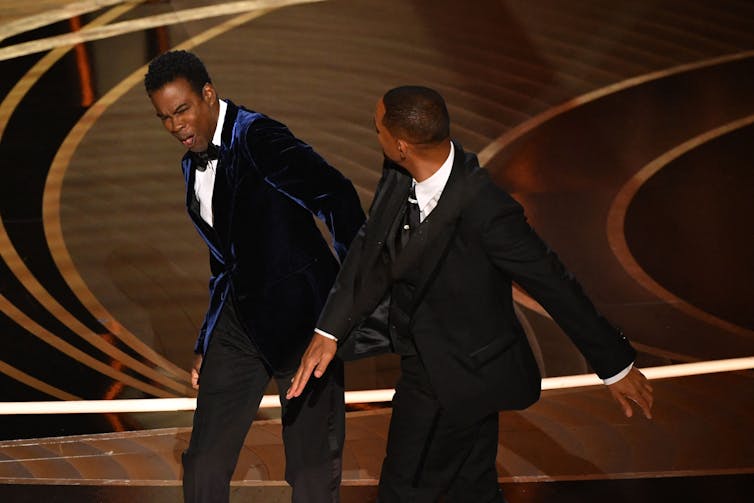
After witnessing the “slap heard around the world” during the 2022 Oscars, I wasn’t surprised when the internet split into two camps: #TeamWill and #TeamChris.
As a social psychologist who studies aggression, I also wasn’t surprised to see support for Will Smith – who slapped comedian Chris Rock after Rock joked about Smith’s wife’s alopecia – involve similar justifications: namely that the actor was “doing what needed to be done” to protect his wife, and that doing so made him “a real man.”
These defenses contain elements of what social scientists call a “culture of honor,” which is prevalent in certain regions, ethnic groups and subcultures around the world.
How cultures of honor flourish
Cultures of honor require men to aggressively defend their reputations against insults or threats, and this imperative extends to protecting their spouses, children and property. To not lash out at slights makes one less of a man.
This concept can be confused with “toxic masculinity” – which is a brand of anti-feminist hypermasculinity that promotes independence, emotional blunting and aggression to establish dominance over men and women. In fact, recent research finds the two concepts are distinct, with a culture of honor more closely tied to benevolent attitudes toward women and notions of chivalry. However, these two concepts can overlap, particularly in more traditional cultures.
Researchers argue that cultures of honor flourished in communities where law enforcement was inconsistent or nonexistent – such as the 19th-century American frontier and herding communities that lived in Africa and Latin America. This work has also been used to understand violence in certain inner-city communities where the police are less trusted.
In these places, a man’s reputation becomes his first line of defense. If it becomes known that slights against him or his family won’t go unpunished, it makes transgressors less likely to push their luck.
When some see violence as acceptable
Research on this topic can be traced to the work of social psychologists Richard Nisbett and Dov Cohen, who sought to explain why homicide rates were significantly higher in the U.S. South and West than in the rest of the country.
Comparing crime statistics, Nisbett was able to show that the difference in homicide rates was due to the South and West having a higher rate of homicides tied to arguments. The country’s different regions were similarly intolerant of violence, more generally, on questionnaires. However, respondents in the South were more likely to say violence was justified when a man – or his family – was insulted.
In subsequent studies, Cohen and Nisbett randomly sent one of two job applications to businesses throughout the U.S.
Accompanying each application was a cover letter in which the applicant sought to explain a felony conviction, chalking it up to a misspent youth. In half of the letters, that felony conviction was a car theft. In the other half, it was manslaughter spurred by an insult. When the employer was from states where a culture of honor is more predominant, the researchers found that the hypothetical murderer actually received more responses – and with a far more understanding tone – than the car thief.
In the same study, Cohen and Nisbett recruited college journalists from around the country and randomly assigned them to write up a story about either an insult-related murder or a felony-related murder. Researchers found that the journalists cast the insult-related murder in a more favorable light when the journalist was writing for a paper in a state with a culture of honor – places like Texas, Alabama and Montana.
In other experiments, researchers have been able to show that after being insulted, people who adhere to an honor ideology register higher levels of testosterone and cortisol – two hormones tied to aggression and stress. They were also less willing to forgive a transgressor and had a tougher time calming down after being slighted. Finally, in questionnaires they were more likely to exhibit anger and shame when recalling a recent insult.

No remorse
In the real world, places that adhere to the honor belief system are more likely to have school shootings. In these same states, convicted murderers were less likely to express remorse ahead of their executions. It’s important, however, to exercise caution around making definitive conclusions about statistically rare events like school shootings and executions.
After Will Smith accepted his Best Actor Oscar for his role in “King Richard,” he praised Richard Williams for doing everything he could to protect his family. To many viewers, Smith was summoning virtues like honor and chivalry to justify his actions earlier in the night.
Off the Oscars stage, you can also see a culture of honor being used to explain the Ukrainians’ dogged defense of their country against a more powerful Russian invader, with Ukrainians praised for honorably defending home and hearth.
Certainly, cultural differences aren’t the only factor influencing the way people responded to the slap. For instance, you’d expect fellow comedians to defend Chris Rock out of solidarity. And racist reactions were bound to emerge.
But while many people were quick to declare that “violence is never the answer,” for others violence can, in fact, be the answer – and that’s due, in part, to the fact that honor culture is alive and well.
H. Colleen Sinclair does not work for, consult, own shares in or receive funding from any company or organisation that would benefit from this article, and has disclosed no relevant affiliations beyond their academic appointment.
This article was originally published on The Conversation. Read the original article.







